-
Creating a Nursing Home Waste Management Plan
There are very specific and strict guidelines in place for nursing home waste management in Atlanta . Any medical facility that generates medical waste must develop a comprehensive waste management program that meets all of the medical waste disposal and recycling regulations that are in place. Here’s how you can make sure that your nursing home is meeting your state’s waste management requirements.
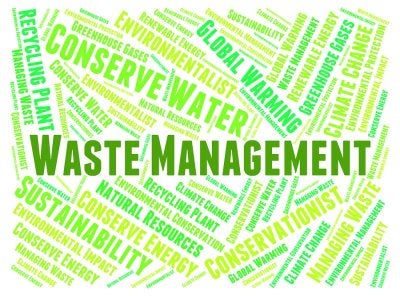
Investigate Your Recycling Options
Your employees and tenants should be given the opportunity to recycle their reusable materials whenever possible. Contact your local recycling center to find out what materials they’re capable of recycling. Set up recycling bins throughout the building in convenient, easy to reach locations. Make sure that employees and tenants understand all necessary recycling facts, like the location of recycling bins, when they’re picked up, and what materials can and can’t be recycled. Recycling centers may offer paper, scrap metal, electronics, plastic, film, universal waste, food waste, fryer oil, and recycling.
Reduce Your Waste ProductionEncourage your employees and tenants to make an effort to reduce waste production. Suggest that they use reusable dishes and cutlery for their meals, rather than disposable ones. Organize tenant swap meets, at which tenants can bring unused or unneeded items to a central location to donate to or swap with other tenants. Reuse packaging materials, like boxes, envelopes, and bubble wrap. Discourage employees from unnecessarily printing out company emails, memos, or documents. Only purchase recyclable items, recycled items, and reusable items. Buy goods in bulk, and buy goods that utilize minimal packaging.
Conform With Medical Waste Disposal Regulations
While many items and materials can be reused and recycled, there are strict state and federal regulations concerning medical waste disposal. Used sharps, such as needles, lancets, and syringes, can never be reused. They can only be disposed of in designated sharps containers. Used medical gloves, bandages, tissues, cotton swabs, and other medical products should be secured in plastic bags before waste disposal or trash pickup. Ask your red bag waste disposal company if they offer reusable red bag medical waste disposal containers.
-
Setting Up Bulk Waste Removal Services
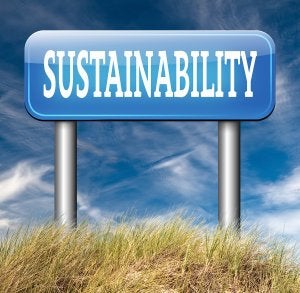 If your company produces commercial or industrial waste in Atlanta , you may want to set up bulk waste removal services with your local waste management company. This service allows you to remove large, unwanted items from the premises. Junk removal and waste removal frees up space, and significantly reduces the risk of potential health and safety issues.
If your company produces commercial or industrial waste in Atlanta , you may want to set up bulk waste removal services with your local waste management company. This service allows you to remove large, unwanted items from the premises. Junk removal and waste removal frees up space, and significantly reduces the risk of potential health and safety issues. A bulk waste removal service provides waste disposal for appliances, electronics, computers, furniture, construction waste, and even furniture. These materials can be reused and recycled at a local recycling center. By implementing a bulk waste removal program for your business, you can reduce waste, reuse and recycle valuable materials, and decrease your waste disposal costs.
An effective waste and junk removal service can reduce fire hazards and company liability by picking up and disposing of cumbersome items that may be preventing employees from moving freely about the building. Your business will also run more efficiently when your employees have more room for production.
-
Compacters and Balers 101
Waste management companies provide a variety of services that can help your business run more efficiently. For instance, you can rent a compacter, baler, or dumpster in Atlanta from your local waste management company. Compacters and balers can reduce both your labor and waste disposal costs, saving your company valuable time and money.
A high-quality compactor reduces waste disposal by compacting trash and refuse, decreasing the amount of times
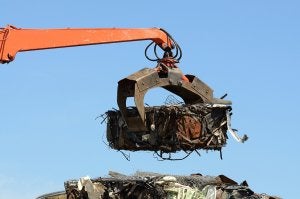 you need to schedule trash pickup or waste removal. A baler compacts recycling materials on a larger scale, allowing you to reduce the space taken up by cardboard or scrap metal recycling. Companies can often sell commercial and industrial recycling materials once they have been compacted in a baler.
you need to schedule trash pickup or waste removal. A baler compacts recycling materials on a larger scale, allowing you to reduce the space taken up by cardboard or scrap metal recycling. Companies can often sell commercial and industrial recycling materials once they have been compacted in a baler. With the use of compacters and balers, your company’s waste disposal process becomes more efficient, as your employees will need to make fewer trips to and from your dumpster or recycling bin. You will be able to decrease waste disposal costs, and may even be able to generate a new revenue stream by selling compacted recycling materials. Renting a compactor or baler from your local waste management company will reduce costs, and help you reuse and recycle materials.
-
Successful Waste Reduction Strategies for Your Business
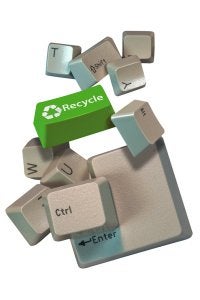 Chances are, your business’s waste disposal and waste management services aren’t as cost-effective or comprehensive as they could be. By adopting a waste management program that focuses on reducing the amount of waste generated, and reusing and recycling salvageable materials, your business can save money and become more eco-friendly. Here are some successful strategies that will help your business reduce, reuse, and recycle in Atlanta .
Chances are, your business’s waste disposal and waste management services aren’t as cost-effective or comprehensive as they could be. By adopting a waste management program that focuses on reducing the amount of waste generated, and reusing and recycling salvageable materials, your business can save money and become more eco-friendly. Here are some successful strategies that will help your business reduce, reuse, and recycle in Atlanta . Implement a Recycling Program
A recycling program is key to lowering your waste disposal costs, reducing the amount of waste your business generates, and reusing valuable materials. Ask your local recycling center for recycling bins, and educate employees on necessary recycling facts and procedures. When you reuse and recycle materials, you decrease the demand for production of new materials, which provides a significant benefit to the environment. You also reduce the amount of landfill space your company requires, and lower your waste disposal cost. Most recycling centers offer paper, wood, cardboard, plastic, electronics, and scrap metal recycling.Analyze Waste Production
Analyzing your waste production provides you with valuable data that can help you reduce waste. Track and record your waste production to determine where you can cut costs, and how you can best implement a recycling program. Once you’re aware of how much waste your company produces, you can identify areas where you can reduce the purchase, production, and use of materials that cannot be reused or recycled, and try to adopt a sustainable waste reduction program.Adopt a Zero Waste Initiative
A zero waste initiative encourages all employees to be aware of their waste production, so that you can reduce, reuse, and recycle as effectively as possible. A zero waste initiative focuses on modifying and regulating the company’s packaging and distribution procedures to include more sustainable, eco-friendly alternatives. You can use recycled products, or recyclable products, in your packaging and distribution materials. Your employees should be involved in the development of a sustainable waste disposal and waste reduction program, so that they feel more invested maintaining its results. -
Managing Waste in a Hotel Setting
Hotels produce a lot of waste, and a comprehensive waste disposal program is crucial to reducing waste in Atlanta . By implementing a recycling program and adopting sustainable waste management practices, your hotel can significantly reduce waste production and waste disposal costs.
Watch this video for more tips on waste management in a hotel setting. Your local waste management company can provide waste analytics that will help your hotel develop an effective waste management program that allows you to reduce waste, and also reuse and recycle any salvageable materials.
-
Your Commercial Waste Management Options
A commercial waste management company in Atlanta can help your company save money and time. It can also provide helpful tools, like recycling, that will allow you to reduce your waste and become a more eco-friendly company.
Waste management companies can offer waste disposal and recycling services to office buildings, supermarkets,
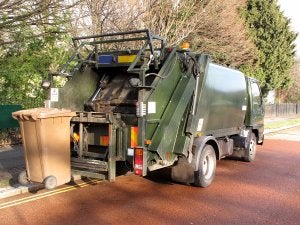 convenience stores, malls, and restaurants. The primary components of a successful commercial waste management program include trashcans, recycling bins, and dumpsters. Many waste management companies allow you to rent dumpsters and trash compactors that can aid you in your waste disposal and recycling.
convenience stores, malls, and restaurants. The primary components of a successful commercial waste management program include trashcans, recycling bins, and dumpsters. Many waste management companies allow you to rent dumpsters and trash compactors that can aid you in your waste disposal and recycling. Commercial waste management companies can also help your business save money. They can help you improve site logistics, and provide analytical data and reporting that allow you to identify primary sources of waste, reduce waste, and manage waste more efficiently. Implementing a recycling program will allow your company to join the effort to conserve the earth’s natural resources. Recycling reduces the demand for new materials, and conserves the energy required to manufacture and distribute new materials.
-
Equipment Repairs from Southern Waste & Recycling
 At Southern Waste and Recycling , we offer comprehensive waste management, recycling, and waste disposal services to the Atlanta area. We provide dumpster rentals and other valuable equipment rentals that will help your household or company save time, money, and energy meeting your waste management and recycling needs. We also provide professional equipment repairs at an affordable price.
At Southern Waste and Recycling , we offer comprehensive waste management, recycling, and waste disposal services to the Atlanta area. We provide dumpster rentals and other valuable equipment rentals that will help your household or company save time, money, and energy meeting your waste management and recycling needs. We also provide professional equipment repairs at an affordable price. Our expert technicians can repair or refurbish a number of different types of waste or recycling equipment. They can also provide basic or complex installations, and equipment modifications for facilities with special needs. We can also provide preventative maintenance for equipment, which will help reduce your need for new equipment or more costly repairs in the future.
We rent, refurbish, modify, install, and repair compactors, balers, front loading dumpsters, roll off dumpsters, and many other types of waste management or recycling equipment. We provide an array of rental, sales, support, and repair options that are sure to fit within your budget.
-
Characterizing the Different Types of Industrial Waste
Industrial waste management in Atlanta is a crucial service for any business whose processes include manufacturing or production. Industrial activities produce a significant amount of waste, and without a comprehensive waste disposal program, the health and safety of your employees may be at risk. With so many different categories of industrial waste, it’s important to understand what materials can be reused and recycled, and how to properly manage and reduce waste disposal. Here are some facts about the different categories of industrial waste.
Chemical Waste
Chemical waste is typically generated by factories, processing centers, warehouses, and plants. This waste may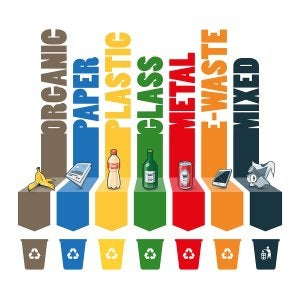 include harmful or dangerous chemicals and chemical residue, and waste disposal must adhere to careful guidelines. These guidelines are instituted and regulated by various government and environmental agencies, such as the Environmental Protection Agency, and the Occupational Safety and Health Administration. There are generally fines associated with non-compliance. Chemical waste must be segregated on-site, and waste disposal may need to be handled by a specialist to ensure compliance with health, safety, and legal requirements.
include harmful or dangerous chemicals and chemical residue, and waste disposal must adhere to careful guidelines. These guidelines are instituted and regulated by various government and environmental agencies, such as the Environmental Protection Agency, and the Occupational Safety and Health Administration. There are generally fines associated with non-compliance. Chemical waste must be segregated on-site, and waste disposal may need to be handled by a specialist to ensure compliance with health, safety, and legal requirements. Solid Waste
In industrial services, solid waste includes a variety of different materials, including paper, cardboard, plastics, packaging materials, wood, and scrap metal. Some of these materials can be reused and recycled by a recycling center. If you don’t have a comprehensive waste management plan that includes recycling, your waste disposal is not going to be as cost-effective or environmentally friendly as it could be. A recycling center can process the majority of industrial solid waste, effectively reducing your waste disposal costs.Toxic and Hazardous Waste
Toxic and hazardous waste is comprised of materials that can cause serious health and safety problems if waste disposal is not handled correctly. This type of waste typically includes dangerous byproducts materials generated by factories, farms, construction sites, laboratories, garages, hospitals, and certain production and manufacturing plants. The EPA and state departments regulate toxic and hazardous waste disposal. This waste disposal is only legal at special designated facilities around the country.
RECENT POSTS
categories
- Uncategorized
- Waste Management Atlanta
- Waste Disposal and Recycling
- Hazardous Waste Disposal
- Chemical waste removal
- solid waste removal
- R3 Program
- Sustainable Organizations
- Sustainable Waste Removal
- Commercial Waste Removal
- Materials Management Program
- Dumpster Rental
- Roll Off Dumpsters
- Construction Site Waste Removal
- Sustainability
- Recycling in Atlanta
- Industrial Recycling
- Industrial Waste Removal Services
- Southern Waste & Recycling
- Waste Removal Atlanta
- Waste Specialists
- Atlanta
- Infographic
- Front Load Dumpsters
- Rear Load Dumpsters
- Reusable Electronics
- Dump Truck Atlanta
- Recyclable Electronics
- Trash Compactors
- Recycling
- Recycling Program
- Office Recycling
- Metal Recycle
- Electronic Waste
